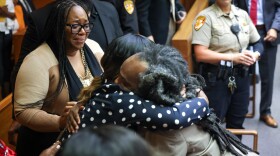The rich resources of Congo are both a boon and a curse. Minerals like gold, silver, or coltan – a key component of cell phones and other electronic devices – are abundant. But their presence spurs corruption and resource battles among corporations, the government, and military groups. Congo was officially at war from 1996-2003, and the country continues to experience armed conflict.
In 2013, the Obama administration agreed to resettle 50,000 Congolese refugees in five years, and some of that population has settled in the Triad. In Greensboro, a group of refugee women from Congo and other Central African countries formed the Umoja Women’s Group to support one another through the transition process. The group is also supported by a team of scholars from the University of North Carolina at Greensboro, the University of North Carolina at Chapel Hill, and North Carolina State A&T University.
Host Frank Stasio speaks with Holly Sienkiewicz, director and research scientist at the Center for New North Carolinians at the University of North Carolina Greensboro; Natacha Nikokeza, program coordinator for community centers at UNCG’s Center for New North Carolinians and Burundi refugee; and Angelique Ndayisenga, a refugee from Congo and member of Umoja Women’s Group.










